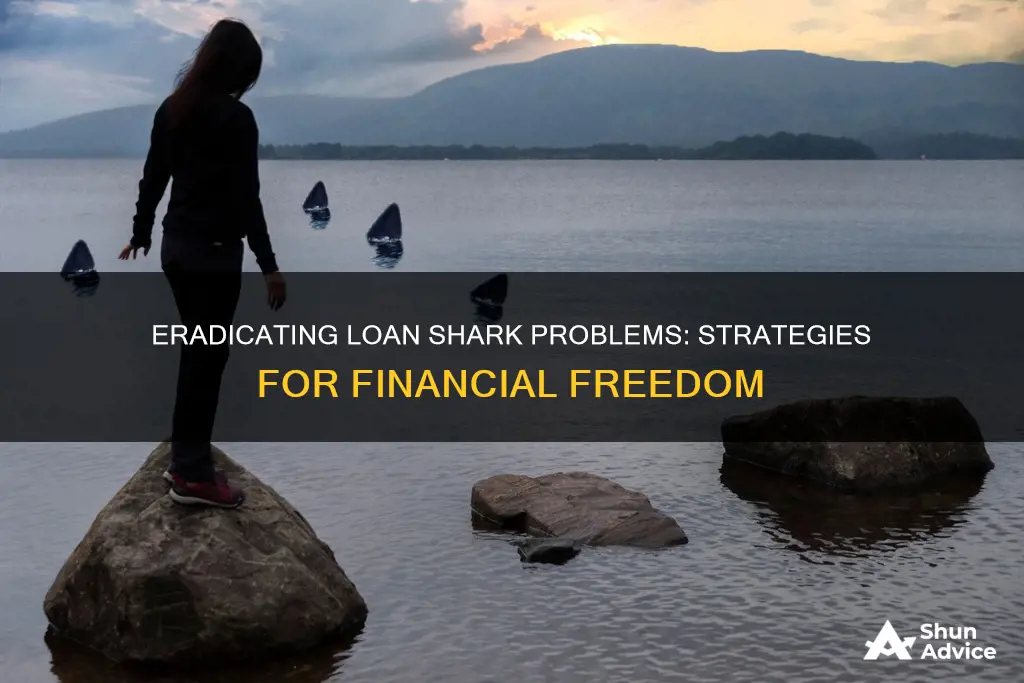
Loan sharks, or Ah Longs, are unlicensed money lenders who charge very high interest rates and use threats and violence to intimidate those who cannot pay them back. They often target financially vulnerable individuals who need money for living expenses or to pay off existing debts. If you are dealing with a loan shark, you should report them to the police and stop making payments. To avoid dealing with loan sharks in the first place, you should only borrow money from legal lenders in banks or from the list of licensed money lenders provided by the Registry of Moneylenders.
| Characteristics | Values |
|---|---|
| How to identify a loan shark | A loan shark is an unlicensed money lender who is not on the official list of licensed money lenders. They may charge above the regulated interest rate of 4% maximum interest per month on the loan principal and 4% for late payment fees. They may also demand upfront payments before loan disbursement. |
| How to avoid loan sharks | Only borrow money from legal money lenders or banks. Check the official list of licensed money lenders to confirm if your creditors are registered. |
| What to do if you are being harassed by a loan shark | Report the harassment to the police or relevant authorities. Stop all payments. Call the X-Ah Long hotline at 1800-924-5664. |
| How to get help with debt | Many social service agencies can help provide credit management information, credit counselling, and negotiation services. Consider borrowing from a credit union, which encourages saving and only borrowing what can be paid back. |
What You'll Learn
- Recognise signs of illegal lenders: check the official list of licensed money lenders
- Report loan sharks: call a relevant hotline or the police
- Stop paying loan sharks: they aim to trap you in debt with high-interest rates
- Only borrow from licensed lenders: they are required to meet you in person and verify your identity
- Seek help from social service agencies: they can provide credit management information and counselling

Recognise signs of illegal lenders: check the official list of licensed money lenders
Recognising the signs of illegal lenders is crucial to solving loan shark problems. Loan sharks, also known as "Ah Longs" in Singapore, often operate by disguising themselves as licensed money lenders. They may use fake registration numbers, office addresses, and even business names of legitimate lenders. To protect yourself from falling into their trap, it is essential to verify the lender's license and check the official list of licensed money lenders.
The Ministry of Law in Singapore maintains a Registry of Moneylenders, which includes a list of licensed money lenders. This list is easily accessible to the public and can be found on the Ministry of Law's website. It is essential to cross-reference the lender's name, contact information, and address with the information provided on the official list. Additionally, the list includes the businesses whose money lending licenses have been suspended, helping you stay informed about any changes in the industry.
To verify a lender's license, you can follow these steps: First, double-check the lender's name, contact number, and office address. Then, visit their physical office and ask to see their money lender license. Compare the license number with the information on the Ministry of Law's list to ensure they match. A licensed lender will also have a secure website, indicated by a lock symbol or "https" in the URL. Their loan contracts will be transparent, stating all terms and charges upfront, including repayment terms, interest rates, and other fees.
Licensed lenders in Singapore are required to adhere to specific regulations, such as not charging more than 4% monthly interest. They are prohibited from engaging in intimidating behaviour and must follow a strict code of conduct. Additionally, they will not request your personal information, such as your SingPass login details, or retain your original NRIC, ATM card, or other sensitive documents. If a lender exhibits any of these behaviours, it is a significant red flag, and you should proceed with caution.
It is crucial to remember that loan sharks often use deceptive tactics to lure individuals into borrowing from them. They may argue that their company name differs from their brand name or that there is a glitch in the system, resulting in their absence from the official list. Do not fall for these tricks, and always verify the lender's credentials thoroughly. Remember, if a lender is not on the official list, it is likely unlicensed and may be a loan shark.
Payroll Protection Loan: What's the Repayment Deal?
You may want to see also

Report loan sharks: call a relevant hotline or the police
If you have borrowed money from a loan shark, you have not broken the law and you are not required to pay them back. Loan sharks are unlicensed moneylenders who charge very high interest rates and sometimes use threats and violence to frighten people who cannot pay back their loans. They aim to keep borrowers trapped in debt by attaching outrageous interest rates to the principal loan amount.
To report loan sharks, it is best to contact the IMLT as soon as possible. They can help you stay safe while they investigate the loan shark. The IMLT has access to Stop Loan Shark materials in over 20 languages, including Polish, Romanian, Punjabi, and Urdu. The police have no power to prosecute loan sharks, and so it is recommended to contact the IMLT first. However, the police may get involved if a loan shark has committed other crimes, such as assault.
Another hotline you can call is the X-Ah Long hotline at 1800-924-5664. This hotline is run by the Singapore Police Force and can help solve your case if you have detailed descriptions of how you have been harassed by loan sharks. It is important to contact the authorities as soon as possible to prevent the loss or compromise of evidence, which can affect legal proceedings.
Understanding Recreational Loans: Funding Your Fun Purchases
You may want to see also

Stop paying loan sharks: they aim to trap you in debt with high-interest rates
Loan sharks are unlicensed moneylenders who charge very high interest rates and sometimes use threats and violence to intimidate those who cannot pay back their loans. They often target families on low incomes or those facing financial difficulties. If you have taken a loan from a loan shark, you are under no legal obligation to repay the debt. Loan sharks have no legal right to recover the debt and cannot prosecute you for failing to pay it back.
Loan sharks aim to trap you in a cycle of debt by offering additional loans to pay off previous ones, with interest rates that make it difficult to repay the principal loan amount. This can have detrimental effects on your life, as seen in the case of Mike, who paid £90,000 to a loan shark over two decades, starting from an initial loan of £250.
To stop paying loan sharks, you can seek help from various social service agencies that provide general credit management information, credit counselling, and negotiation services. These agencies are experienced in dealing with such situations and can offer support and guidance. Additionally, you can consider contacting a confidential hotline, such as the Stop Loan Sharks Helpline, to receive specialist advice and assistance.
It is important to remember that there are legal and safer alternatives to borrowing from loan sharks. Licensed moneylenders or banks can provide access to cash, and there are also reputable lenders who cater to individuals with low incomes or poor credit ratings. Credit unions are another option, as they encourage saving and allow you to borrow only what you can afford to pay back, with a maximum interest rate of one per cent per month.
Missing Documents: Nelnet Loans and National Collegiate's Impact
You may want to see also

Only borrow from licensed lenders: they are required to meet you in person and verify your identity
Dealing with loan sharks can be a scary and stressful experience. Loan sharks are unlicensed moneylenders who charge very high interest rates and use threats and violence to frighten people who can't pay back their loans. They often target financially vulnerable individuals who struggle to obtain legal loans but need money urgently for living expenses or to pay off existing debts.
Licensed moneylenders are required to meet the borrower in person at their approved place of business to verify the borrower's identity and personal information. This is an important step to ensure that you are not borrowing from a loan shark. Loan sharks often approve loans remotely without any in-person meetings and may not even ask for your payslip or ensure you have a stable job. They know they can always use harassment and intimidation tactics to force you to repay the loan.
Before taking out a loan, always verify that the lender is licensed. You can do this by checking the official list of licensed moneylenders, which is regularly updated by the government. In Singapore, the Registry of Moneylenders maintains such a list, which includes businesses whose money lending licence has been suspended. If a lender is not on this list, they are likely operating as a loan shark. Be aware that loan sharks may market themselves as licensed money lenders to deceive potential borrowers.
Licensed moneylenders are also not allowed to make unsolicited calls or send messages via social media or messaging platforms to offer loans. They are only allowed to approve or grant loans to a person within their approved places of business. They will not ask borrowers to transfer money for "GST fees" or "processing fees" before loan disbursement. If a lender exhibits any of these behaviours, it is likely that they are a loan shark.
By following these steps and only borrowing from licensed lenders, you can help protect yourself from the dangers of loan sharks and ensure that you are borrowing from a reputable and regulated source.
Title Loans in Virginia: Are They Legal?
You may want to see also

Seek help from social service agencies: they can provide credit management information and counselling
If you are facing loan shark problems, seeking help from social service agencies is a crucial step towards resolving the issue. These agencies have extensive experience in dealing with such situations and can provide valuable support in the form of credit management information and counselling. Here are some key aspects to keep in mind:
Range of Services
Social service agencies offer a variety of services to assist individuals in managing their credit and debt. This includes credit counselling, budget counselling, and educational resources for managing spending and debt. They can also provide information on debt management plans, which can help simplify your monthly debt obligations and reduce interest rates and fees.
Certified Professionals
The credit counsellors you will have access to through social service agencies are certified and trained professionals. They have expertise in areas such as consumer credit, money management, and debt management strategies. These counsellors will work with you to understand your unique financial situation and develop a personalised plan to tackle your loan shark problem.
Non-Profit Organisations
Many credit counselling organisations are non-profit, which means their primary focus is on providing assistance rather than making a profit. They often offer free or low-cost financial advice, ensuring that you can access the help you need without incurring additional financial burdens.
Confidentiality and Respect
Reputable social service agencies will treat you with respect and ensure that your privacy is maintained. They will not require you to provide detailed personal information before offering assistance. Additionally, they will not contact you without your explicit consent, ensuring that you can seek help discreetly and confidentially.
Referrals and Testimonials
When considering a social service agency, look for organisations that are willing to provide referrals or testimonials from past clients. This will allow you to hear firsthand how the agency has helped others in similar situations. It adds a layer of trust and assurance that the agency is reputable and effective in their work.
In summary, seeking help from social service agencies can provide you with the tools and support needed to address loan shark problems effectively. Their credit management information and counselling services are designed to empower you to make informed financial decisions and regain control of your financial life. Remember that you don't have to face these challenges alone, and these agencies are equipped to guide you towards a brighter financial future.
Calculating Discounts: Understanding the Power of Percentages
You may want to see also
Frequently asked questions
Loan sharks are unlicensed moneylenders who charge very high interest rates and use threats and violence to frighten people who can't pay back their loans. They often target financially vulnerable individuals, such as those who struggle to obtain legal loans but need money for living expenses or to pay off existing debts. Some signs that you may be dealing with a loan shark include:
- They are not on the official list of licensed moneylenders.
- They offer loans through unsolicited calls, messages, or emails.
- They approve loans remotely without any in-person meeting.
- They demand upfront payments before loan disbursement.
- They do not provide a loan contract or give an incomplete contract.
If you encounter a loan shark, it is important to report them to the authorities as soon as possible. You can do this by calling a hotline such as the X-Ah Long hotline at 1800-924-5664 or your local police hotline. You can also submit a report online or in person at your nearest Neighbourhood Police Centre. Additionally, you should stop making any payments to the loan shark.
To protect yourself from loan sharks, it is important to only borrow money from licensed lenders, such as banks or legal money lenders. You can find a list of licensed lenders on the Registry of Moneylenders or by checking with your local regulatory body, such as the Financial Conduct Authority (FCA). If you are on a low income and only need to borrow a small amount, consider borrowing from a credit union, which encourages saving and only borrowing what you can afford to pay back.
If you are being harassed or threatened by a loan shark, it is important to report this to the police as soon as possible. You may also want to seek help from social service agencies or credit counselling services, which can provide support and guidance on managing your debt. Remember that you are under no legal obligation to repay a debt to an unlicensed lender, and they have no legal right to recover the debt.







